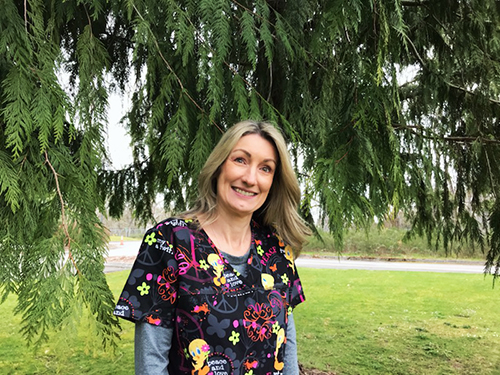I just feel like it’s contributing to the overall. Whatever I do, I do it with the frontline staff in mind at all times. It’s my way of doing anything and everything I can to help them. It makes it matter.
 Denise Martinez never imagined that she would relate so much to a scene in a decades-old film. But that was before COVID-19 changed the roles and work of so many people.
Denise Martinez never imagined that she would relate so much to a scene in a decades-old film. But that was before COVID-19 changed the roles and work of so many people.
“I’m basically like the Wizard of Oz,” she said. “I’m behind the screen.”
Martinez, the training manager for the Child Study and Treatment Center in Lakewood, had plenty on her daily to-do list before the pandemic struck. These, days, however, she also researches best practices for fighting the disease and keeping it from spreading, orders supplies and protective gear and finds any way she can to support the staff.
“Being a small facility, it’s typical to wear two hats,” Martinez said. “But with COVID, it’s typical to wear five hats and five pieces of clothing and two pairs of shoes, but you’re still one person.”
Her regular duties include heading up new employee orientation, assisting with site planning and running a training department. With normal operations askew due to the coronavirus, Martinez has also set up employee screening areas, been a safety officer, and filled in when staffers go on breaks.
“I just feel like it’s contributing to the overall,” she said. “Whatever I do, I do it with the frontline staff in mind at all times. It’s my way of doing anything and everything I can to help them. It makes it matter.”
Her research skills, attention to detail and willingness to help have made Martinez the backbone of the facility, CSTC Director of Nursing Services Erik Logan said.
“One of Denise’s best qualities is her focus on the details,” Logan said. “You wouldn’t know it, but she is in the background silently making CSTC a safer environment for our staff and patients.”
That level of attention and preparation have been integral in keeping the facility largely infection free.
“Knowing that we had a pandemic plan in place we feel good that we were able to produce certain things,” Martinez said. “We already have systems in place, so if it happens again we won’t be starting from scratch.
“We definitely have a strong foundation and it’s been proactive as opposed to reactive.”
Martinez joined the Behavioral Health Administration in 2004 and spent 12 years working with patients before moving into her administrative role in 2019. That move has changed how she interacts with the children CSTC serves, but she gets a lot of satisfaction from helping the facility as a whole.
“I really miss (working with patients),” Martinez said. “But in that role I was working with just one unit. In this role I am impacting every unit.”
